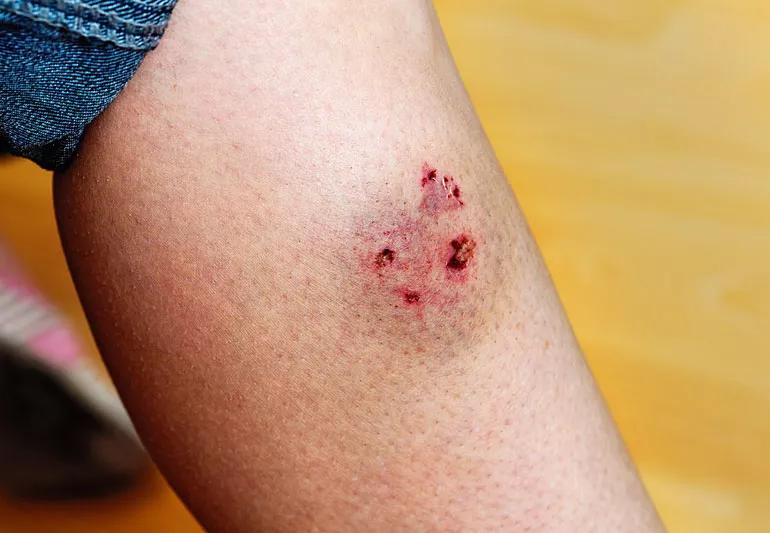Infection is the biggest danger

You’re playing with your dog, and somehow, between growls and tail wags, it can happen. Those canine teeth can bite or scratch. Or alternatively, you could be walking down a street and an unknown mutt can attack without warning.
Advertisement
Cleveland Clinic is a non-profit academic medical center. Advertising on our site helps support our mission. We do not endorse non-Cleveland Clinic products or services. Policy
Either way, there are steps you need to take right away to treat the wound and reduce the risk of infection. You’ll need professional medical attention the same day.
A dog’s front teeth will grab and compress your tissue, and their smaller teeth can also tear your skin. The result is an open, jagged wound. If the wound becomes infected, it is often severe, says emergency medicine physician Stephen Sayles III, MD.
“The No. 1 concern with these bites is infection,” he says. “You may need hospitalization and require intravenous antibiotics. You should always see a primary care provider if you’re bitten.”
No matter what, make sure you see a doctor within eight hours of a dog bite, he says. Waiting longer raises your infection risk. If you have diabetes or are immunocompromised, your infection risk is even greater.
If a dog bites you, take these steps right away:
Advertisement
Your doctor will want to know more about the dog that bit you and how it happened. They will also likely clean the wound again, apply antibiotic ointment and prescribe antibiotics, such as Augmentin, if there’s an infection concern.
After any bite, you should make sure you know when your last tetanus shot was — and that you’re up-to-date. While a tetanus immunization is good for 10 years, Dr. Sayles notes, your doctor may recommend a booster if the wound is dirty and it’s been more than five years since your last shot.
Depending on the wound, your doctor may also recommend stitches. Generally, though, dog wounds are left open to heal unless they are on the face or if they could leave particularly severe scars if left unsutured.
Roughly half of dog bites introduce bacteria, including staphylococcus, streptococcus and pasteurella, as well as capnocytophaga.
Unvaccinated and feral dogs can also potentially carry — and transfer — rabies, so your doctor will want to know details about the dog that bit you.
Ultimately, Dr. Sayles says, caring for a dog bite is about keeping bacteria from causing an infection.
Advertisement
Learn more about our editorial process.
Advertisement

Most recommended precautions center around minimizing bruising or swelling

Even one drink can have an impact on your cognitive function leading to slurred speech, blurred vision and impaired memory

Understand who may (and may not) benefit

Lorem ipsum dolor sit amet. Et odio Quis vel ipsam omnis eum alias deleniti et placeat impedit non voluptas galisum hic autem enim et cupiditate aliquid. Est beatae quidem non facilis autem ut commodi nisi aut tempore rerum et dolores voluptatem cum enim optio id sapiente quasi. Ad laboriosam officiis 33 cupiditate sequi ea voluptatum consectetur qui necessitatibus voluptate et quasi doloremque et facere explicabo quo explicabo officia

Seeking help through therapy can be an important step in improving your quality of life when you have UC

Type 2 diabetes isn’t inevitable with these dietary changes

Applying a hot or cold compress can help with pain